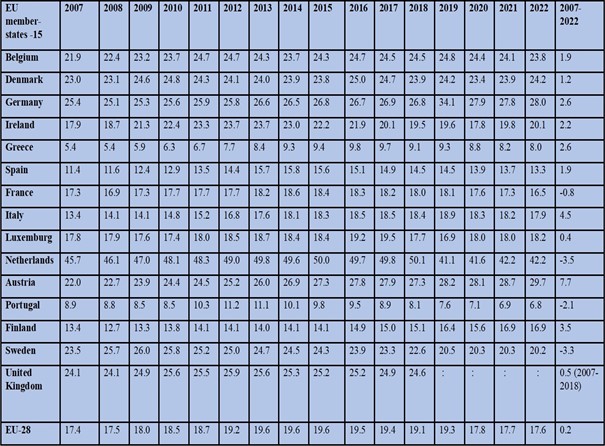“Leased” Workers in the EU and in Greece
Abstract
This article is a literature review on the practice of workers “leased” through Temporary Work Agencies (TWAs). Reference is made to their main features, the institutional framework regarding the protection of these workers as well as the impact that this practice has on the workers. The next section is a presentation of the reasons that lead to the under- or over-estimation of the actual number of workers “leased” through TWAs. The empirical research is presented next, which was conducted about the workers “leased” through TWAS, based on secondary data of the Eurostat’s Labor Force Survey (LFS). The numbers of “leased” workers in the EU-15 during the period of the financial crisis, 2007-2018, is mentioned. The sectors employing the highest numbers of workers “leased” through TWAs and the demographics of the workers are detailed. In addition, two atypical forms of work are described. These two are temporary and part-time employment in the EU-15 during the period of the financial crisis and onwards, based on the most recent data available from Eurostat, from 2007-2022.
References
Doerflinger, N., & Pulignano, V. (2016). Temporary Agency Work and Trade Unions in Comparative Perspective: A Mixed Blessing? Journal of Workplace, 5(2), 1-10. https://doi.org/10.1177%2F2158244015575633
European Directive 2008/104/EC of the European Parliament and of the Council (2008): On temporary agency work. Official Journal of the European Union.
Eurofound. (2009). “Temporary agency work and collective bargaining in the EU” Dublin.
Eurostat. (2023). Temporary Agency Workers (annual average). Retrieved from http://www.ec.europa.eu/eurostat
Eurostat. (2023). Temporary Employment (annual average). Retrieved from http://www.ec.europa.eu/eurostat
Eurostat. (2023). Part time Employment (annual average). Retrieved from http://www.ec.europa.eu/eurostat
Eichhorst, W., & Braga, M. et al. (2013). The role and activities of Employment Agencies. Germany: IZA.
Forde, C., & Slater, G. (2008). Agency working in the UK: what do we know? Centre for Employment Relations Innovation and Change, University of Leeds, Policy Report
Fudge, J. (2011). Global care chains, employment agencies and the conundrum of jurisdiction: Decent work for domestic workers in Canada. Canadian Journal of Women and the Law, 23, 235-264. https://doi.org/10.3138/cjwl.23.1.235
Hveem, J. (2013). Are temporary work agencies stepping stones into regular employment? IZA Journal of Migration, 2(21), 1-27. https://doi.org/10.1186/2193-9039-2-21
ILO. (2009). Private Employment Agencies, temporary agency workers and their contribution to the labour market. Geneva: ILO.
ILO. (2015). Non – standard forms of employment. Geneva: ILO.
IZA. (2013). The Role and Activities of Employment Agencies. Germany: IZA.
Law 4052/2012 (GG 41/Α) “Law on the competency of Ministry of Health and Social Solidarity, and Ministry of Labour and Social Insurance for the implementation of the Law “Approval of Draft Contracts of Funding Facilitations between the European Financial Stability Facility (EFSF) and the Hellenic Republic and the Bank of Greece, and other emergency provisions for the reduction of the public debt and the rescue of the national economy: and other provisions.
Jahn, E. J., & Rosholm, M. (2014). Looking beyond the bridge: The effect of temporary agency employment on labor market outcomes, in European Economic Review, 65, 108-125. https://doi.org/10.1016/j.euroecorev.2013.11.001
Law 2956/2001 (Government Gazette 258/Α) “Restructuring of the Hellenic Manpower Organization and other provisions”.
Law 4093/2012 (Government Gazette 222/A) "Approval of the Medium-Term Fiscal Strategy Framework 2013-2016. Urgent measures for the implementation of Law 4046/2012 and the Medium-Term Fiscal Strategy Framework 2013-2016".
Lixouriotis, Ι. (2015). Labour legislation. Athens: Nomiki Vivliothiki.
Lymperaki, A., & Dendrinos, G. (2010). Flexible work: New forms and quality of employment. Athens: Editions Kerkyra.
Ministry of Social Insurance and Social Welfare. List of licences issued to TWAs. Athens.
OECD, (2000). Employment Outlook. Paris: OECD. https://doi.org/10.1787/empl_outlook-2000-en
Papadimitriou, K. (2007). Temporary employment. “Leasing” by profession. Athens: Sakkoulas.
Rompoti, E., Ioannides A., & Koutroukis, T. (2022). Employment Flexibility and Industrial Relations Reforms in Greece of Memoranda, E-Journal of International and Comparative Labour Studies.
Rompoti E., & Ioannides A. (2019). “leasing” of employees and financial crisis in the European Union and in Greece”. Greek Review of Social Research (GRSR). Issue 151, 99-135. https://doi.org/10.12681/grsr.19836
Rompoti, E., & Feronas, A. (2017) The impact of the economic crisis on the labour market of countries under the economic adjustment regime: A comparative analysis, Social Policy, 5, 38-63. https://doi.org/10.12681/sp.10600.
Voos, E., & Vitolos, K. et al. (2013). Temporary Agency Work and Transitions in the Labour Market. Institutional frameworks, empirical evidence, good practice and the impact of social dialogue. Brussels: Eurociett.
Storrie, D. (2002). Temporary Agency Work in the European Union. Luxembourg: European Foundation for the Improvement of Living and Working Conditions.


This work is licensed under a Creative Commons Attribution 4.0 International License.
Copyright for this article is retained by the author(s), with first publication rights granted to the journal.
This is an open-access article distributed under the terms and conditions of the Creative Commons Attribution license (http://creativecommons.org/licenses/by/4.0/).









1.png)














